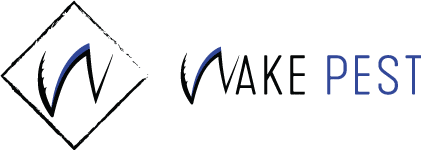Spiders might be the most visible creepy crawlers in your home, but have you ever stopped to wonder why they’re there in the first place? At Wake Pest, we often remind our clients that spiders are predators. If your home hosts a healthy population of insects (which can happen in even the cleanest houses), it becomes a spider’s paradise.
Why Spiders Love a Bug Buffet
Spiders are opportunistic feeders. If your home has a steady supply of insects, spiders see it as a permanent buffet. The types of bugs that commonly draw spiders include:
- Flies and Gnats: Drawn by food waste or decaying matter.
- Moths: Often attracted to porch lights at night.
- Roaches: Thrive in dark, damp areas, offering spiders a protein-rich meal.
- Ants: In some cases, spiders will prey on smaller ant species if they invade your kitchen or pantry.
So while you might focus on eliminating the spiders you see, the root cause of large spider populations is often an abundance of insects.
What Is Holistic Pest Control?
Holistic pest control looks at all the factors that contribute to pest problems—your home’s environment, the presence of other pests, seasonal changes, and more. Rather than using a single product to eradicate spiders, we consider:
- Insect Prevention: Sealing entry points, reducing food sources, and eliminating standing water to minimize insect populations.
- Eco-Friendly Solutions: Targeted treatments that focus on problematic pests while minimizing harm to beneficial insects.
- Long-Term Maintenance: Ongoing inspections and minor adjustments that keep your home unappealing to bugs and spiders alike.
It’s a comprehensive strategy that often requires collaboration between homeowners and professionals for best results.
Steps to Reduce Insects—and Spiders Follow Suit
If you want fewer spiders, start with these insect control measures:
- Eliminate Food Sources: Keep counters clean, store food in airtight containers, and empty trash cans regularly.
- Manage Moisture: Fix leaks, use dehumidifiers, and ensure proper ventilation to discourage both insects and spiders.
- Reduce Entry Points: Seal cracks around windows, doors, and your home’s foundation to keep pests out.
- Proper Waste Disposal: Dispose of waste promptly, and use sealed bins to avoid attracting flies or roaches.
- Outdoor Lighting: Opt for yellow bulbs or motion sensors to reduce moths and other insects at night.
Once the insect population drops, the spider population often declines as well due to lack of food. This natural attrition is a key principle of holistic pest control.
Integrated Pest Management (IPM) Tactics
Holistic pest control aligns closely with Integrated Pest Management (IPM) strategies, which involve:
- Monitoring: Regularly checking for signs of pests, from insects to spiders.
- Identification: Differentiating between beneficial insects, neutral insects, and harmful pests.
- Prevention: Utilizing physical barriers, reducing clutter, and maintaining cleanliness.
- Targeted Control Methods: Using chemicals or baits only when necessary, in the smallest effective amounts.
- Evaluation: Assessing the effectiveness of treatments and making adjustments for ongoing improvement.
IPM creates a balanced environment where pests are kept at bay without relying on harsh, broad-spectrum pesticides that can affect the entire ecosystem.
The Role of Beneficial Insects
Believe it or not, some insects are allies in the fight against more destructive or bothersome pests. Ladybugs, for example, eat aphids that can damage your garden. Praying mantises feast on various insects, and even certain spider species help keep other insect populations in check outdoors.
Holistic pest control aims to protect these beneficial species by reducing widespread chemical use. This approach encourages a naturally balanced ecosystem in your yard, which can further deter infestations of any single pest (including spiders).
Consequences of Ignoring the Whole Picture
If you focus solely on killing spiders without addressing the insect population:
- Short-Term Relief Only: You might see fewer spiders initially, but they’ll likely return if their food source remains plentiful.
- Insect Pests Flourish: Spiders do eat insects, so removing them entirely can sometimes lead to an uptick in other pest problems.
- Potential Chemical Overuse: Relying too heavily on pesticides for spiders may create chemical-resistant insects or harm non-target organisms.
Wake Pest’s Holistic Approach
When our team arrives at your home, we don’t just look for webs and spider egg sacs. We:
- Evaluate Insect Activity: Identify types of insects present, their entry points, and why they’re drawn to your home.
- Address Environmental Factors: Advise on how to reduce moisture, clutter, or lighting setups that attract insects.
- Implement Targeted Solutions: Use minimal, eco-friendly treatments to tackle specific pests without disrupting helpful insects or pollinators.
- Follow Up: We monitor progress to ensure both insect and spider populations are under control, making any necessary adjustments over time.
Success Stories: Stats and Examples
Studies show that IPM-based programs can reduce pest populations by up to 90% over time with less chemical usage compared to traditional blanket pesticide treatments. By eliminating or drastically reducing the insect food source, spider sightings tend to drop significantly.
We’ve worked with local Raleigh homeowners who reported recurring spider issues. In many cases, we discovered underlying insect infestations (like roaches or ants) that were fueling spider activity. After addressing those insects, the spider sightings decreased to near zero in just a few weeks.
Final Thoughts
In the realm of pest control, spiders are often just the symptom of a broader issue—namely, a buffet of insects. Holistic or integrated pest management takes into account the entire environment, focusing on root causes rather than just treating the “symptoms.” By managing insect populations, you naturally reduce the appeal of your home to spiders.
At Wake Pest, we believe in providing lasting solutions that respect both your home and the local ecosystem. So if spiders have become more than a minor annoyance, remember that the path to a spider-free home often involves looking at the bigger picture. Handle those insects, seal those entry points, and you’ll be well on your way to a balanced, comfortable living environment without an eight-legged takeover.

